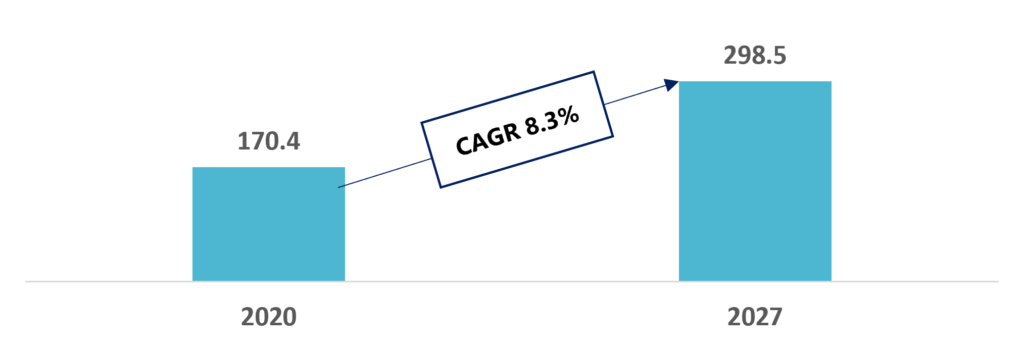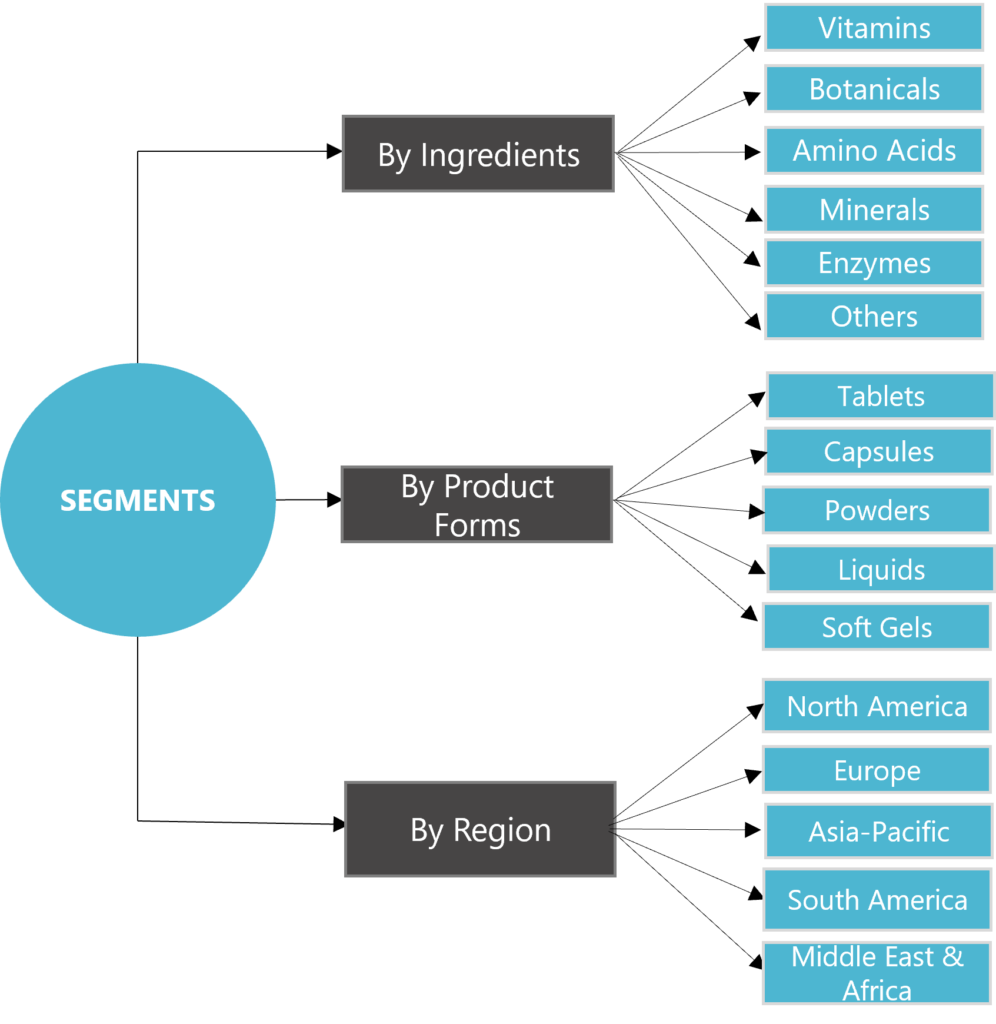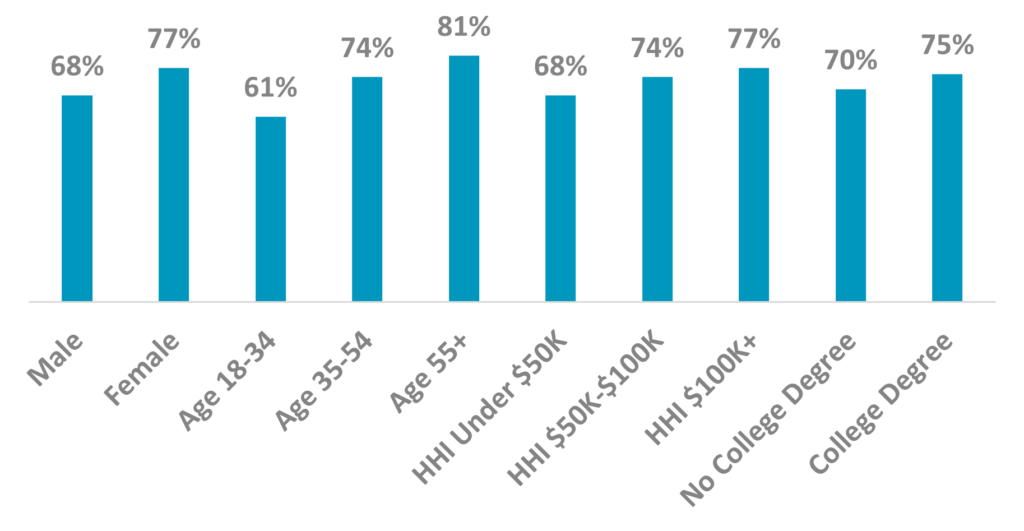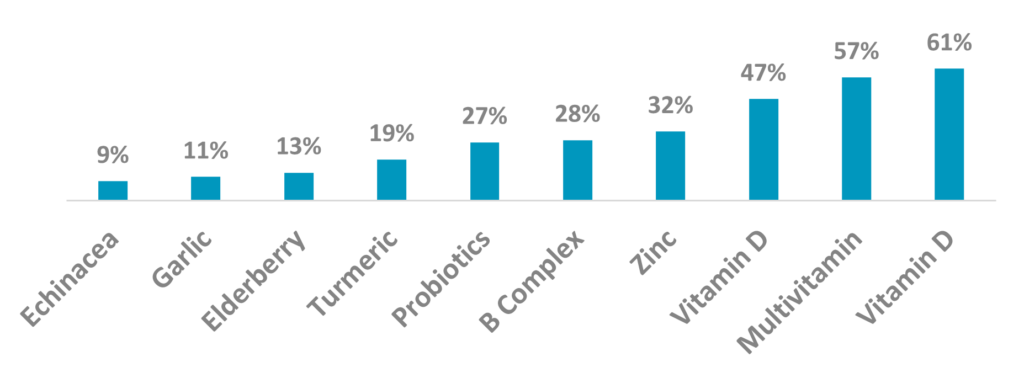
Dietary Supplements Market-Global
Introduction
Dietary supplements intend to supplement a person’s diet. They are not medications and are not meant to be used to treat, diagnose, alleviate, prevent, or cure illnesses. Dietary supplements are commonly used to increase the intake of vital nutritional components in the human body.
Global Dietary Supplements Market Size and Potential Growth
⮞ In 2020, the global dietary supplements market was valued at $170.4 billion and is expected to reach approximately $298.5 billion by 2027, growing at an approximate CAGR of 8.3%.

⮞ In 2020, the dietary supplements market in the US was estimated at $46 billion.
⮞ In 2022, the vitamin & supplement manufacturing market size in the UK was estimated at $1.5 Billion.
⮞ In 2020, the UAE dietary supplement market size was valued at approximately $109.87 million and is expected to reach $155.85 million by 2026, growing at a CAGR of more than 6%.
Market Segmentation

Top Players

Drivers and Challenges

Drivers
Rise In Consumer Preference
⮞ The growing emphasis on holistic health and immunity has resulted in a few significant dietary changes among consumers. The usage of vitamins, minerals, immune-boosting meals, organic goods, supplements, and other nutritional supplements has surged. As individuals become more concerned about their overall well-being, the demand for immunity-boosting products has increased.
COVID -19 Pandemic
⮞ COVID-19 has significantly helped boost the sales of immunity supplements such as vitamins and minerals. The pandemic has raised public awareness about the need for a healthy immune system to fight the virus. This, in turn, helped to enhance the market for immunity-boosting supplements.
Shift Towards Plant-based Supplements
⮞ The market for plant protein ingredients is expanding rapidly, as consumers shift away from animal proteins and toward plant-based proteins. This is very likely to change customers’ preferences toward plant-based herbal supplements and botanicals, generating even more potential for the herbal supplements industry to expand.
Challenges
High Cost Of Dietary Supplements
⮞ The cost of a supplement might vary greatly depending on the origin of the components (synthetic or natural) and the season. Synthetic components offer cheaper manufacturing costs and do not need the management of natural sources from which functional principles are to be derived. Synthetic raw materials cannot compete with natural raw materials in terms of quality. Another aspect that might impact the ultimate cost of dietary supplements is the bioavailability or seasonality of the raw ingredients used in the products.
Usage Trends
⮞ Higher Penetration Among Female Population in The US
According to CRN’s 2020 Survey on Dietary Supplements, 77% of the female population in the US uses dietary supplements as compared to 68% of the male. The penetration was highest among the 55+ age group with 81%.

⮞ Vitamins and Minerals Has The Highest User Penetration
According to CRN’s 2020 Survey on Dietary Supplements, 98% of the users use vitamins and minerals, while 46% use some kinds of specialty supplements. Vitamin C, Multivitamin, Vitamin D, and Zinc remained the top 4 ingredients among the immunity-boosting supplements.
User penetration by category

Top 10 Ingredients for Immunity

Data Sources: Markets and Markets, Mordor Intelligence, Globe News Wire, Ibisworld, Techsciresearch, and others
Read more Market Reports and view Infographics.
Must Read

